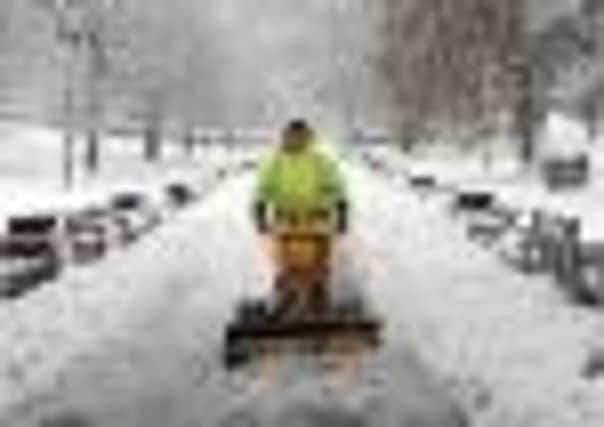City recruits snow warden army to keep streets clear


The city council today unveiled a range of measures that will be put in place this year to try to make sure the Capital does not suffer a third successive year of snow chaos.
The measures have been announced after the council was hit by a £7m bill last year – more than five times the original budget – after being forced to call in squads of private contractors and even the army to help clear roads and pavements.
Advertisement
Hide AdAdvertisement
Hide AdSalt stocks will also be more than trebled, which will mean that the authority can increase the number of roads and pavements that it makes top priority.
Arrangements will also be put in place to try to avoid “blanket closures” of the city’s schools, with teachers to be asked to travel to their nearest school if they can’t make it to their normal place of work.
Councillor Robert Aldridge, the city’s environment leader, said: “It is vital for the city’s economy that we keep Edinburgh moving during periods of severe winter weather. It’s also important that residents are well informed about our approach to dealing with snow and ice.
“We’ve consulted extensively about this and, whilst feedback about our effort last year was generally positive, we’ve acted on areas where people felt improvements could be made. I’m confident we’re very well prepared and I would call on Edinburgh residents to make sure they are prepared too.”
Advertisement
Hide AdAdvertisement
Hide AdAll of the new measures being introduced will cost £1.5m, while the annual winter weather budget will also be increased from £1.3m to £2.3m. The budget is based on a “normal” winter, but weather as bad as last year will mean more money could need to be made available.
Adapting and modifying “non-winter” machinery such as mowers and sweeping equipment to become snow ploughs and salt spreaders will cost £232,000, which council officials say “makes good economic sense”.
A further £315,000 will be spent on providing schools, neighbourhood offices and residential staff with pedestrian-operated salt spreaders, snow brushes and snow blowers to try to ensure that the impact on schools and vulnerable people is reduced.
The voluntary “snow wardens” will be recruited by neighbourhood council offices, and only asked to help during “severe” weather. They would be issued with gloves, a shovel and a reflective vest, then asked to go out and clear the streets, although officials insist that they will only be expected to do “what they feel capable of doing based on their level of health and fitness”.
Advertisement
Hide AdAdvertisement
Hide AdThe move to increase salt stocks is expected to cost £850,000, including the expense of creating more storage facilities. And more staff will be on stand-by to react to weather warnings and alerts.
It will mean that 640 kilometres of pavement will also be given top priority, as well as the city’s busiest roads.
Despite the measures, a “step change” in the council’s approach has been ruled too expensive, meaning options such as a massive increase in the fleet will not happen.
Mark Turley, director of the council’s services for communities department, said: “In an ideal world, there would be a fleet large enough to treat all roads and pavements in a single sweep, and to be able to repeat this as often as necessary to keep them all clear of snow and ice.
“Given the current financial situation, and also the uncertainty about weather predictions, it is impossible to justify such levels of expenditure.”